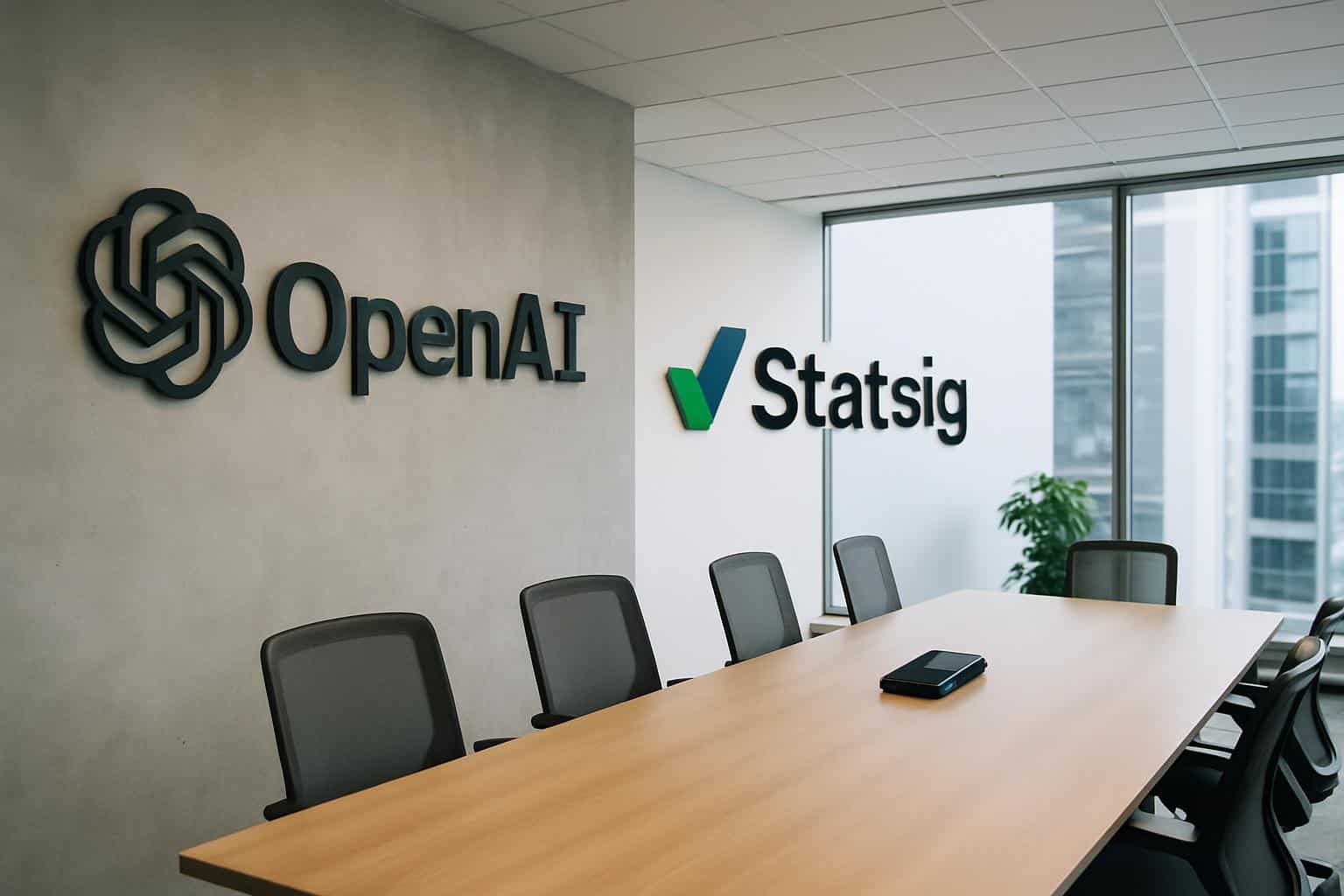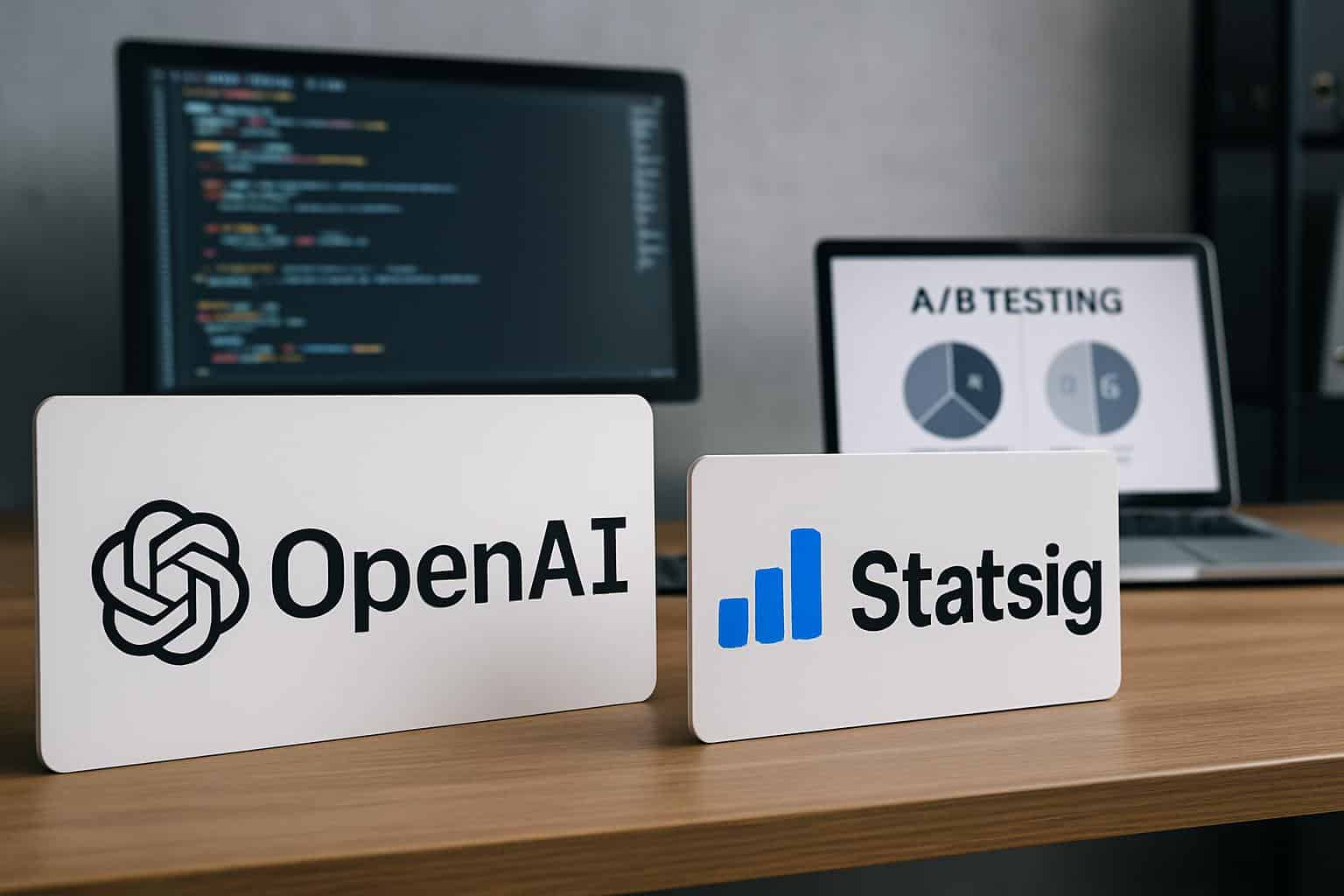OpenAI is acquiring the product experimentation startup Statsig and has hired the company’s founder, Vijaye Raji, as its new CTO of Applications, as it focuses harder on developing and iterating on consumer and enterprise AI products — arguably at a faster, more agile rate than before now that it’s outsourced the work to a startup that grants it partial ownership of the talent creating the features and a strategic edge in controlling further developments. The deal, announced by OpenAI in a company blog post and amplified in posts by executives, highlights a broader leadership shake-up aimed at crystallizing the company’s split between Applications and platform-focused work.
Why Statsig is important for OpenAI’s product velocity
Statsig is most famous for its end-to-end experimentation stack: feature flags, A/B testing, metrics pipelines, guardrails — all tasked for engineering teams to ship, measure, and iterate on features based on real user outcomes. Baking that capability into OpenAI’s Applications group also gives the company an internal engine for quick iteration on ChatGPT and other end-user products, shortening the loop from idea to deployment to evaluation and then rollback if necessary.

Raji, a Meta engineering veteran who has worked on large scale experimentation systems, will work under Fidji Simo, the new head of Applications. The partnership points to a practical move: you bring in a leader who has scaled experimentation culture before and arm the Applications org with an infrastructure that can run thousands of tests safely, while ensuring product stability and trust.
In AI applications, experimentation isn’t an optional feature—it’s the main method for validating model and UX changes in the wild. Studies by Ronny Kohavi, who ran experimentation at both Microsoft and Amazon, found tens of thousands of controlled online experiments running at scale each and every year, where small, incremental improvements would frequently snowball into significant increases in engagement and revenue. Booking. com has publicly revealed running over a thousand concurrent A/B tests, demonstrating that a disciplined testing pipeline can be considered a competitive moat. For generative AI, where small changes in prompts and policies can materialize into downstream effects in the user journey, a robust experimentation process is critical.
Leadership reshuffle signals the flowchart of two lanes: apps and science
As part of the acquisition, OpenAI is rearranging some key roles. Kevin Weil, the company’s chief product officer, is shifting to head OpenAI for Science, a new team that looks to develop an AI-based platform that will speed up scientific discovery. Weil tells it that he will work closely with researcher Sebastien Bubeck, previously a Distinguished Scientist and VP of AI at Microsoft, hinting at a mandate that incorporates front-line research with practical tooling… Read more
On the enterprise side, Srinivas Narayanan, who was head of engineering, will also take over as CTO of B2B applications and he will work with COO Brad Lightcap on customer-facing solutions. That alignment places technical decision-making closer to OpenAI’s largest customers, at whom procurement, security review, and deployment complexity can chip away at time-to-value unless product and go-to-market are tightly aligned.
What it means for ChatGPT, and future products
Look for shorter release cycles, more visible feature gating and an increase in structured product trials across ChatGPT and related offerings. Today’s experimentation platforms like Statsig bring metrics governance — what does “success” mean — and automatically handle exposure control so that OpenAI can use multi-variant tests without jeopardizing reliability or safety. This is especially crucial for AI capabilities: online guardrails can detect factuality or latency regressions, roll back models, isolate segments (e.g., enterprise tenants) where possible to reduce risk.

The purchase also suggests potential convergence of offline model performance evaluation and online product performance. Lots of teams now depend on a cocktail of benchmark suites, human preference ratings, and live A/Bs to prove changes have worked. By combing these pipelines, OpenAI can focus on improvements that lead to quantifiable user value — faster completion of tasks, higher satisfaction scores, or lower support burdens — rather than optimizing for benchmarks in a vacuum.
Statsig will remain independent for now
OpenAI said the acquisition was subject to regulatory review. After the deal was complete, all Statsig staff will migrate to OpenAI, and the startup will continue to function as an independent entity out of its Seattle office and supporting its current group of customers. And that structure is one that mirrors a playbook we have seen in other developer tooling acquisitions: the product retains its neutrality and momentum for existing customers, even as the core technology is integrated into the parent company.
For Statsig’s customers, the near-term promise is of continuity. For OpenAI, the benefit is immediate access to a battle-tested system in which to try experiments, and the associated data pipelines and governance, which are famously difficult to reproduce quickly.
Competitive and enterprise implications
As the leading AI players race to productize research, the ability to instrument real world performance is becoming a strategic differentiator. Google and Microsoft have both owned internal experimentation platforms; for OpenAI bringing Statsig in-house now provides it with similar leverage around the Applications aspect of its strategy. For companies considering AI vendors, these leadership changes — Simo emphasized consumer-grade polish, Narayanan B2B, Weil scientific tooling — telegraph clearer lanes of ownership and responsibility.
Done right, the disciplined experimentation culture and streamlined leadership structure might mean quickly rolling out features that matter to users more safely, such as better agent reliability, richer multimodal workflows, and enterprise controls that jump over the security puddle rather than slow teams down.
And in a market where speed and trust are table stakes, OpenAI’s bet on Statsig feels less like a tactical add-on and more like core infrastructure for the next era of AI applications.

